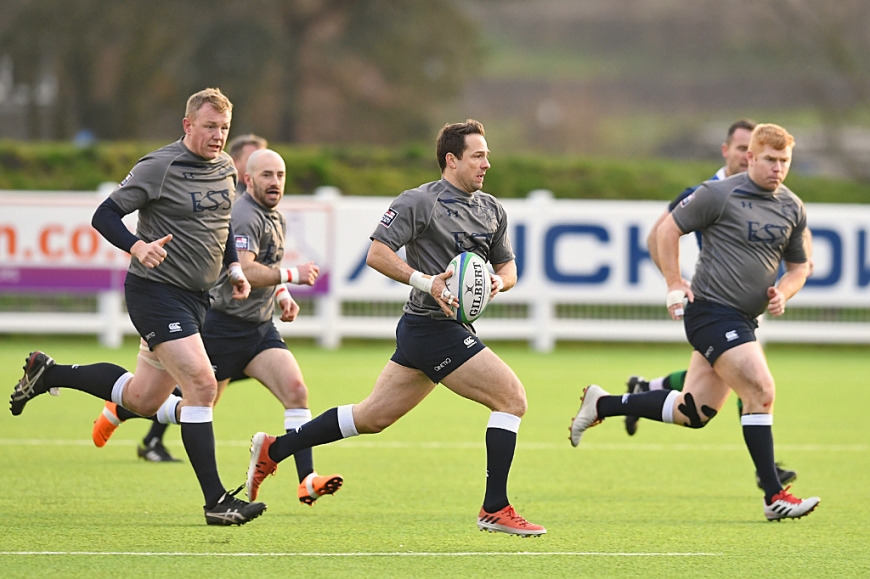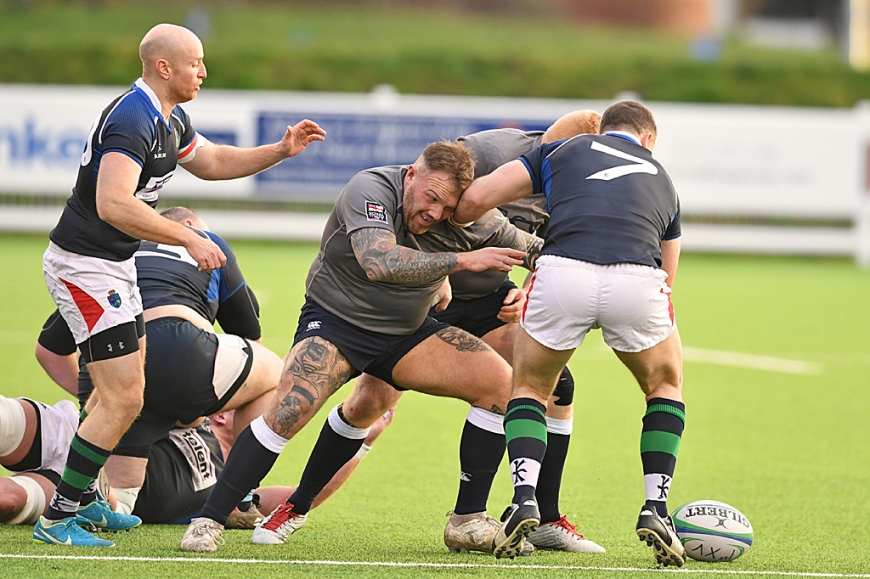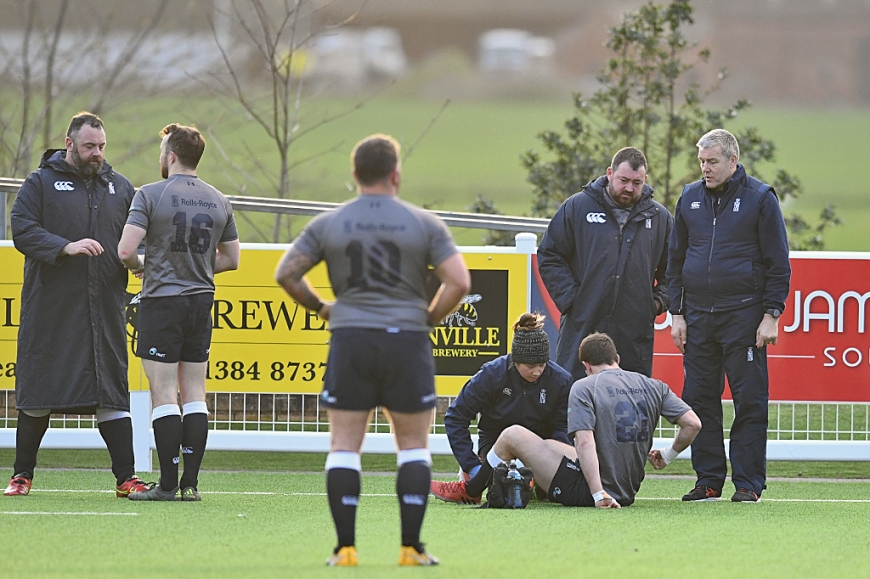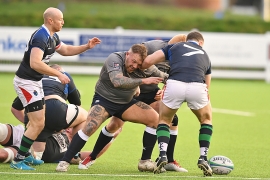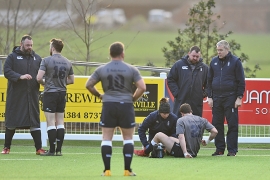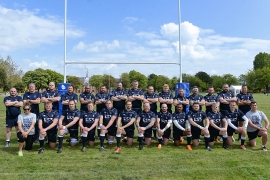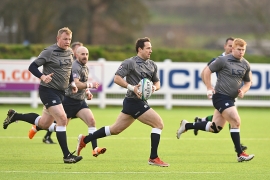Mariners Require Paradigm Shift for 19/20 Season Success
Make no bones about it but last season was extremely challenging for the Mariners if the results are anything to go by. Revisiting the fixtures in reverse order, the team ended on a low having been humbled in front of a reasonably sized crowd by a fluent and creative Army Masters side (24 – 69 L). The result was particularly exasperating, as the boys in blue started strongly demonstrating an expansive style coupled with a direct approach of their own with Andy Vance, Alan Sullivan and Peter Kewn (or was it John Lamsin?) crossing the line with Paul Saberton converting them all and slotting a penalty.
The game against the RAF will be painful to look back on (29 – 5 L) because all the style and confidence on display at the Torbay Sharks game (52 – 32 L) failed to materialise with only a single score from Ignatuis Oberholzer to show after a torrid afternoon’s toil. The cancellation of HM Prison Service game will have hindered the coaches’ season plan so the matches against the British Police (30 – 12 L), Havant RFC (18 – 21 L) and Devonport Services (24 – 29 L) were vital early on to build continuity and as the score lines suggest they were pretty intense close encounters.
So to the 19 /20 Inter Service campaign and the TSG’s efforts to adapt and overcome the previous season’s shortfalls. Jamie Campbell-Baldwin took the opportunity to ask ADoR Jon Holroyd (JH), Head Coach Chris Richards (CR), Assistant Coach Andy Vance (AV) and Team Manager Guy Pallett (GP) where the previous season unraveled (if it indeed did) and their intentions to make a fist of this year’s schedule.
Match fitness is always difficult to maintain given the paucity of matches and individual operational requirements. How are you going to overcome this?
CR: Fitness testing is going to be a standard thing at training sessions: so I hope that this will generate self-motivation to train harder when not in the camps.
AV: A much more professional and holistic approach to individual, and squad, fitness has been put in place in preparation for the first game. This includes a Mariners-specific S&C program to ensure time away from the squad is not wasted and that time with the squad is used to focus more on organisational matters and whole team cohesion. More emphasis has been placed on regular rugby, whether for unit, command and/ or civilian rugby clubs at the weekends. Fitness will be key to the Mariners’ success this season!
GP: We have created an additional programme for the players to follow which will enable their overall standard to rise; additionally we’ve asked the players to play, at club, establishment and regional more because match fitness is a whole different ball game.
JH: Whilst fitness remains at the very heart of the Navy in everything we do, the challenge that faces the Mariners is a conflicting one. Normally sat in managerial roles day-to-day, invariably involving a desk, basic fitness levels become a secondary thought, more over life tends to provide obstacles too – families and differing priorities, not necessarily our own! That said, the commitment to Rugby as a whole is getting better, most Mariners regularly play club rugby and (appear) better prepared ahead of the season.
You intend to bring the players together for a longer time before matches. Why the change?
CR: Simple really! The more time we have with the players, the more beneficial coaching we can achieve.
GP: We felt that given the short time together last season, we were unable to achieve our goals with players travelling significant distances to train and play. We believe players will be more at ease allowing for greater concentration.
AV: The challenge that being of a certain age brings (family dependents, middle managers at work etc.) means that previously, Mariners’ rugby has traditionally developed and maintained a ‘turn up and play’ model. Extra time together will allow for greater organisation understanding and cohesion, which, along with increased fitness levels and recovery time, should see some success.
JH: the old model of arrive, train and play did not bring the squad together very well, a longer, more focused period but with fewer matches will hopefully allow for great squad cohesion and bring individuals together as a team.
Who have you chosen as captain? What does he bring to the squad?
AV: We have not chosen a captain yet. We need to see who sets the example by coming back fit and strong and enthusiastic – also we don’t know the starting team so can’t really chose a Captain.
CR: As Vancey said, we are not looking at the captaincy straightaway. To do so could detract from bringing the team together as a cohesive unit.
GP: We talked as a TSG and have complete buy-in and as it’s the start of a new season for us, with the work commitments of the players growing at home and abroad it would be unfair to appoint a captain, we need a leader who is fully committed, who demands the respect of others. It’s a big ask for the right person, hence the delay.
JH: Oh to have the luxury of choice ahead of the season. That said, no one is guaranteed an IS squad position.
The lead up games set the trend for success but the RAF and Army games are what really matter. How can the Mariners turn these results around?
GP: Desire, hard work and full commitment, when we won the Inter Services in 2015 the IS squad members played in every game, trained hard. We worked hard on our warm up games with continual improvement and made sure we were ready for the challenge. The TSG and players have to buy into the RNRU core values and believe in what we can achieve.
CR: This year we are condensing the warm up games to one every two weeks from February as opposed to a fixture every month. By doing this we are preparing the players for the conditions they are more likely to encounter at the Inter Services when it will be dryer and the ground harder.
JH: Simple – consistency, continuity and commitment.
AV: By developing a game plan based on Inter Services’ games and that intensity – not being concerned with short term results in warm up games. All of the warm up games should be seen as ‘live training sessions’, as the Inter Services is the ‘make or break’ for Mariners success. Performance, understanding and game plan cohesion is much more important for IS success than individual results along the way.
Typically, the flow from the Senior XV to the Mariners is hindered by needs of the service. How do you get the message to the wider navy that representational rugby is still available to the over 35?
CR: We have had the current players and TSG monitoring the Navy Cup and Inter-Command sides, looking for active over 35s resulting in a few new names coming up. Posters out to unit PTIs promoting vets’ rugby, hopefully with an article in Globe and Buster and Navy News to follow. We still have to build a link with the senor side to persuade them to play for us and this is an ongoing process.
AV: I’d suggest this is a question for the wider RNRU, we are the TSG for the Mariners’ squad and can only do so much. We would be looking for more buy-in from above to spread the message. Articles like this can always help our recruitment cause.
JH: The Holy Grail. Much is said of the Navy 365 family, whilst the process from grassroots to Seniors is well understood, there is still much that needs to be done with regards to how the mariners fit in to the whole family. Not only do we still play a good standard of rugby, gone are the days of ‘old-man’s rugby’, sadly the legacy is proving much harder to shift than anticipated. Whilst a few seniors have transitioned, many don’t. This link we need to be better at, the flow between squads must be both ways and, perhaps, some joint training sessions would prove beneficial. Mariners not only play representative rugby but also grow the next generation of coaches and managers that eventually feed all other teams.
GP: We all know of those players who turn up to establishment training, play commands but never believe they can represent the Navy; Mariners never turn players over 35 away we want you to come and give us a chance. The Navy needs to promote that your involvement in sport does not stop when you are promoted; there is always a role for you. Word of mouth will only get the squad to grow so far! So if you are interested in playing and are over 35 before the first Inter-Service game against the RAF (18 Apr 2020) then contact me at Guy.Pallett894@mod.gov.uk immediately.
#GoNavy #AncientMariners #FillYourBoots.
Mariners’ TSG
Assistant Director of Rugby Jon Holroyd; Head Coach Chris Richards; Assistant Coach Andy Vance; Team Manager Guy Pallett; Assistant TM Kev Boulton; Assistant TM Gary Mitchell; Medical Kila O’Boyle; Assistant Medical Charlotte Cane
Words by J Campbell-Baldwin
Images by Royal Navy Rugby Union ©John Walton


